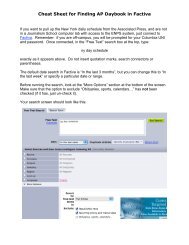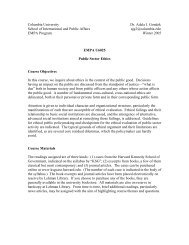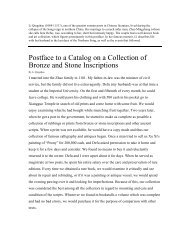Song: I Watered My Horse at the Long Wall Caves - Columbia ...
Song: I Watered My Horse at the Long Wall Caves - Columbia ...
Song: I Watered My Horse at the Long Wall Caves - Columbia ...
You also want an ePaper? Increase the reach of your titles
YUMPU automatically turns print PDFs into web optimized ePapers that Google loves.
This poem depicts <strong>the</strong> hardships suffered by laborers who were conscripted to build <strong>the</strong> Gre<strong>at</strong> <strong>Wall</strong> (also<br />
called <strong>the</strong> <strong>Long</strong> <strong>Wall</strong>) during <strong>the</strong> harsh reign of Qin Shihuangdi, <strong>the</strong> first emperor of China. Chen Lin<br />
lived <strong>at</strong> <strong>the</strong> end of <strong>the</strong> Han dynasty and died in AD217, and although Chen Lin was a literary aristocr<strong>at</strong>,<br />
this poem shows <strong>the</strong> influence of popular ballads.<br />
<strong>Song</strong>: I <strong>W<strong>at</strong>ered</strong> <strong>My</strong> <strong>Horse</strong> <strong>at</strong> <strong>the</strong> <strong>Long</strong><br />
<strong>Wall</strong> <strong>Caves</strong><br />
By Chen Lin<br />
I w<strong>at</strong>ered my horse <strong>at</strong> <strong>the</strong> <strong>Long</strong> <strong>Wall</strong> caves,<br />
w<strong>at</strong>er so cold it hurt his bones;<br />
I went and spoke to <strong>the</strong> <strong>Long</strong> <strong>Wall</strong> boss:<br />
“We're soldiers from Taiyuanwill<br />
you keep us here forever?””Public works go according to schedule—<br />
swing your hammer, pitch your voice in with <strong>the</strong> rest!”<br />
A man'd be better off to die in b<strong>at</strong>tle<br />
than e<strong>at</strong> his heart out building <strong>the</strong> <strong>Long</strong> <strong>Wall</strong>!<br />
The <strong>Long</strong> <strong>Wall</strong>—how it winds and winds,<br />
winds and winds three thousand li;<br />
here on <strong>the</strong> border, so many strong boys;<br />
in <strong>the</strong> houses back home, so many widows and wives.<br />
I sent a letter to my wife:<br />
“Better remarry than wait any longer—<br />
serve your new mo<strong>the</strong>r-in-law with care<br />
and sometimes remember <strong>the</strong> husband you once had.”<br />
In answer her letter came to <strong>the</strong> border:<br />
“Wh<strong>at</strong> nonsense do you write me now?<br />
Now when you're in <strong>the</strong> thick of danger,<br />
how could I rest by ano<strong>the</strong>r man's side?”<br />
(He)<br />
If you bear a son, don't bring him up!<br />
But a daughter - feed her good dried me<strong>at</strong>.<br />
Only you can't see, here by <strong>the</strong> <strong>Long</strong> <strong>Wall</strong>,<br />
<strong>the</strong> bones of <strong>the</strong> dead men heaped about!
(She)<br />
I bound up my hair and went to serve you;<br />
constant constant was <strong>the</strong> care of my heart.<br />
Too well I know your borderland troubles;<br />
and I—can I go on like this much longer?<br />
Source: Burton W<strong>at</strong>son ed. and trans., The <strong>Columbia</strong> Book of Chinese Poetry: From<br />
Early Times to <strong>the</strong> Thirteenth Century. New York: <strong>Columbia</strong> University Press, 1984. 1<br />
1 ""<strong>Song</strong>: I <strong>W<strong>at</strong>ered</strong> <strong>My</strong> <strong>Horse</strong> <strong>at</strong> <strong>the</strong> <strong>Long</strong> <strong>Wall</strong> <strong>Caves</strong>"," Microsoft® Encarta®<br />
Encyclopedia 2000. © 1993-1999 Microsoft Corpor<strong>at</strong>ion. All rights reserved.





